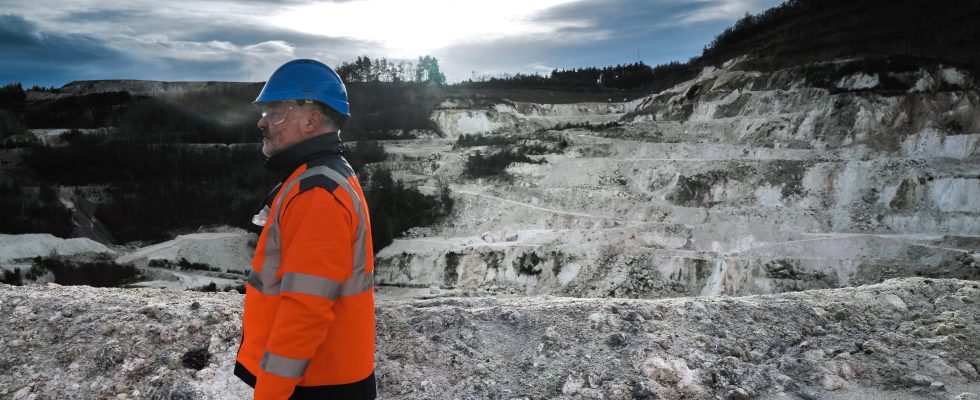A gigantic program, major reflection. Since March 11 and until July 7, French people, residents or not in Allier, are invited to give their opinion on the lithium mine project located in the town of Echassières and supported by the company Imerys. This public debate, a first for the sector, sets the tone for a question that goes beyond the framework of this Massif Central department: should the country reopen mines and exploit its subsoil in search of essential materials for energetic transition ? Complex reflection in which issues of sovereignty and acceptability intertwine. Locally, residents and environmentalists are concerned about the environmental impact of such a mine. However, it no longer has much to do with those of fifty years ago, believes Eric Marcoux, doctor of science in geology and author of Minerals in our daily lives, published by the Geological Society of France: “People always represent themselves Germinal, but between the mine of yesterday and that of today, the gap is the same as between a locomotive of yesteryear and our TGV.”
In Echassières, the government intends to catch the transition train and develop an electric battery sector – of which lithium is an essential component. It thus supports the French group’s project and aims to free itself from foreign dependence, especially Chinese, in terms of supplies. But can he really do it?
In the coming years, the global demand for lithium promises to be colossal, experts warn. According to the “zero emissions” scenario from the International Energy Agency (IEA), it should be multiplied by five between 2022 and 2030. And this acceleration could be even more significant in Europe, while the continent wants to produce by the end of the decade a quarter of electric car batteries – compared to 3% annually in 2020 -, while having banned the sale of thermal engine vehicles by 2035. The French executive has set the objective of manufacturing two million electric vehicles in the territory by 2030. Whether tenable or not, this ambition requires a significant amount of resources.
Several deposits in France
For years, France has neglected updating its knowledge of its subsoil. But it is lucky: it can count on identified deposits of lithium, from hard rock reserves. That of Beauvoir, in the town of Échassières, where kaolin has long been extracted, is the best known. Imerys plans to extract and transform 34,000 tonnes of lithium hydroxide per year from 2028, and for at least 25 years. This production, if it comes off the ground, would make it possible to equip nearly 700,000 electric vehicles annually, explains the group. And therefore to cover a third of the French objective by the end of the decade. The Bureau of Geological and Mining Research (BRGM) has also identified other lithium resources in Finistère, and suspects other deposits in Haute-Vienne and Creuse. For the moment, no projects have been launched in these regions. However, “to open a mine, it takes time, between 10 and 15 years”, specifies Eric Marcoux. A time horizon which compromises the dream of French self-sufficiency in lithium, at least in the medium term.
However, other promising sources have been identified, this time in geothermal waters. These are warm and often salty waters, located at great depths, and used for the production of heat and electricity. Several exploration permits are currently being processed. In the Massif Central, where the company Lithium de France, a subsidiary of Arverne Group, obtained a new exclusive research permit in February. And in the Rhine basin. There, the Eramet and Electricité de Strasbourg project, called Ageli, seems the most advanced. The two companies want to develop lithium production from geothermal brines in the town of Rittershoffen, in Alsace. The first kilos of battery-grade lithium carbonate were manufactured at the end of 2021. Ultimately, the consortium is counting on 10,000 tonnes per year by 2030. According to its calculations, based on data from the National “Batteries” Strategy, this production “could meet around 10% of French needs for lithium carbonate”, estimates Ludovic Donati, director of Eramet’s French lithium project.
Advantage of geothermal lithium
“In terms of population acceptability, geothermal lithium presents an enormous advantage, judges Benjamin Louvet, raw materials manager at OFI Invest Asset Management. The environmental and social impact is very low: the industrial installation is already present and geothermal energy ensures the site’s electricity production.” Another advantage: “this lithium is refined almost immediately, which is not only the case for that made from hard rocks, as in Échassières,” continues the expert.
The government’s desire is to build a complete value chain, going from extraction to battery manufacturing, then their recycling. “There is no need to be 100% French since we are located in a European industrial environment,” tempers Ludovic Donati. According to the head of Eramet, total autonomy for France remains a wishful thinking. But he assures that, put together, the different projects “could easily cover half of our needs”.
“With Échassières and the Rhine basin, the country clearly has a place to take in this market,” adds Benjamin Louvet. Nearly 80 million vehicles are sold per year worldwide today. Our national production potential would almost cover this. 2%. It’s far from negligible.” Without having a subsoil particularly rich in critical metals, nor a significant influence in the mysteries of mining diplomacy, France will therefore be able to do well if it manages to optimize its sector. We know the adage: it’s better to have a small home than a big one in someone else’s.
.
